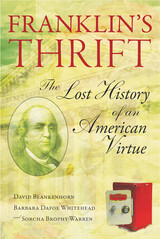
Statistics on the American family are sobering. From 1975 to 2000, one-third of all children were born to single mothers, and one-half of all marriages ended in divorce. While children from broken homes are two to three times more likely to develop behavioral and learning difficulties, two-parent families are not immune to problems. The cost of raising children has increased dramatically, and married couples with children are now twice as likely as childless couples to file for bankruptcy. Clearly, the American family is in trouble. But how this trouble started, and what should be done about it, remain hotly contested.
In a multifaceted analysis of the current state of a complex institution, Family Transformed brings together outstanding scholars from the fields of anthropology, demography, ethics, history, law, philosophy, primatology, psychology, sociology, and theology. Demonstrating that the family is both distinctive in its own right and deeply interwoven with other institutions, the authors examine the roles of education, work, leisure, consumption, legal regulation, public administration, and biology in shaping the ways we court and marry, bear and raise children, and make and break family bonds.
International in approach, this wide-ranging volume situates current American debates over sex, marriage, and family within a global framework. Weighing mounting social science evidence that supports a continued need for the nuclear family while assessing the challenges posed by new advocacy for same-sex marriage, and delegalized coupling, the authors argue that only by reintegrating the family into a just moral order of the larger community and society can we genuinely strengthen it. This means not simply upholding traditional family values but truly grasping the family's growing diversity, sustaining its coherence, and protecting its fragility for our own sake and for the common good of society.

Americans today often think of thrift as a negative value—a miserly hoarding of resources and a denial of pleasure. Even more telling, many Americans don’t even think of thrift at all anymore. Franklin’s Thrift challenges this state of mind by recovering the rich history of thrift as a quintessentially American virtue.
The contributors to this volume trace how the idea and practice of thrift have been a vital part of the American vision of economic freedom and social abundance. For Benjamin Franklin, who personified and promoted the idea, thrift meant working productively, consuming wisely, saving proportionally, and giving generously. Franklin’s thrift became the cornerstone of a new kind of secular faith in the ordinary person’s capacity to shape his lot and fortune in life. Later chapters document how thrift moved into new domains in the nineteenth and twentieth centuries. It became the animating idea behind social movements to promote children’s school savings, create mutual savings banks and credit unions for working men and women, establish a federal savings bond program, and galvanize the nation to conserve resources during two world wars.
Historians, enthusiasts of Americana or traditional American virtues, and anyone interested in resolving our society’s current financial woes will find much to treasure in this diverse collection, with topics ranging from the inspirational lessons we can learn from the film It’s a Wonderful Life to a history of the roles played by mutual savings banks, credit unions, and thrift stores in America’s national thrift movement. It also includes actual policy recommendations for our present situation.
READERS
Browse our collection.
PUBLISHERS
See BiblioVault's publisher services.
STUDENT SERVICES
Files for college accessibility offices.
UChicago Accessibility Resources
home | accessibility | search | about | contact us
BiblioVault ® 2001 - 2024
The University of Chicago Press









